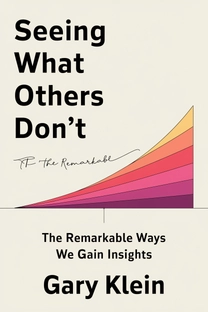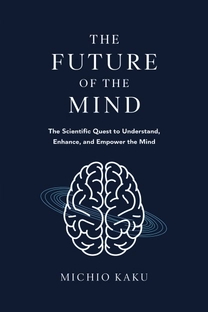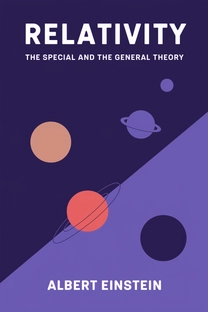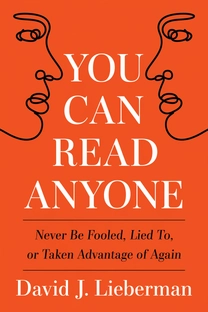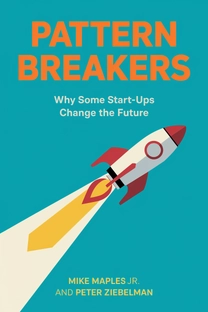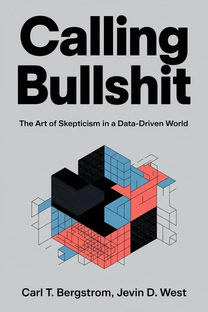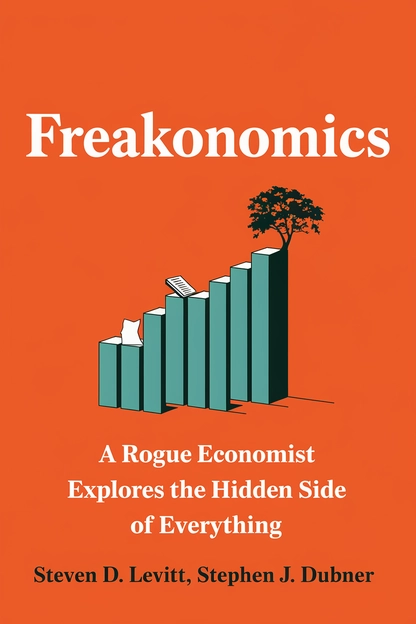
Freakonomics
A Rogue Economist Explores The Hidden Side of Everything
by Steven D. Levitt, Stephen J. Dubner
Brief overview
This book unearths surprising connections between everyday events and underlying economic principles. By taking on topics ranging from crime to parenting to real-estate sales, it shows how incentives and information shape people’s choices in unexpected ways. Drawing on intriguing data, it reveals that the hidden side of everything can be both illuminating and provocative.
Introduction
Think about the last time you faced a puzzle in life. Maybe it was figuring out why certain people behave in ways that seem baffling. This book starts by suggesting that many baffling actions can be better understood by looking at the incentives behind them.
Written by an unconventional economist and a journalist, it blends real-world data with storytelling. Instead of focusing on corporate balance sheets, it tackles topics like cheating teachers, real-estate agents, and crack dealers living with their moms. The goal? To see the hidden forces that shape daily life.
By viewing familiar problems with new eyes, the authors show that raw data can tell compelling stories. Whether they’re studying crime statistics, baby names, or online dating habits, they reveal that our world is governed by both obvious and subtle incentives.
The Power of Incentives
Incentives are at the heart of every human interaction. If you want to understand behavior, follow the rewards and the penalties. People generally seek to maximize gains and reduce losses, but these gains are not always about money.
Consider a famous daycare experiment in Israel: a small fine for late pick-ups led to more tardy parents instead of fewer. Why? Because the moral and social incentives (not inconveniencing the teacher) got replaced by a small economic fee. Parents decided the price was worth the extra time.
This shift highlights the complexities of motivation. Moral incentives can be overshadowed by economics. Social pressures can dissolve under certain circumstances. The authors emphasize that well-meant rules often backfire if we misunderstand what truly motivates people.
What is Freakonomics about?
Freakonomics: A Rogue Economist Explores The Hidden Side of Everything, challenges how we perceive the world by uncovering unexpected truths behind common societal behaviors. Written by Steven D. Levitt and Stephen J. Dubner, this book delves into the hidden incentives and economics that shape seemingly unrelated events. Through insightful analysis and engaging storytelling, it sheds light on how incentives govern actions in crime, parenting, real estate, and more, redefining our understanding of everyday life.
What makes Freakonomics stand out is its ability to turn mundane topics into fascinating studies of human behavior. Levitt and Dubner demonstrate that small incentives and pieces of information can influence decisions and outcomes in profound ways. The book examines how individuals respond to different motivators, whether they are economic, social, or moral, revealing the intricate interplay of choices and consequences. By challenging conventional wisdom, Freakonomics encourages readers to question assumptions, making complex theories accessible and practical.
Review of Freakonomics
Freakonomics offers a fresh perspective on the world of economics through its exploration of hidden incentives and unrecognized patterns. Authors Levitt and Dubner excel at presenting complex subjects in a relatable and engaging manner, drawing readers in with anecdotes and captivating data analysis. By dissecting subjects such as crime rates, parenting habits, and real estate dealings, the book establishes itself as an insightful commentary on human motivations.
One key strength of Freakonomics is its accessibility; it bypasses traditional economic jargon and connects with a wider audience. Levitt and Dubner emphasize the practical applications of their findings, demonstrating how awareness of incentives can lead to improved decision-making and smarter policies. The writing is direct, combining wit with a clear narrative that entertains while it educates, making economics approachable for readers of all backgrounds.
The book's relevance extends beyond students or academics—it's a valuable resource for anyone curious about the mechanics of everyday life. Freakonomics is recommended for those eager to enhance their understanding of the world through an economic lens. By revealing the invisible strings that guide our decisions, Levitt and Dubner encourage readers to look beyond the surface and think critically about their environment.
Who should read Freakonomics?
- Economics Students: Those studying economics can gain fresh insights into real-world applications of theories and data analysis.
- Social Scientists: Researchers and analysts interested in human behavior would benefit from the book's unique approach to societal issues.
- Policy Makers: Understanding the impact of incentives can aid in designing more effective policies and regulations.
- General Readers: Anyone with a curiosity about human motivations and societal patterns will find the book's accessibility appealing.
- Business Professionals: Professionals can apply the insights into decision-making and strategic planning, uncovering hidden opportunities.
About the author
Book summaries like Freakonomics
Why readers love Mindleap
10-Minute Book Insights
Get the core ideas from the world's best books in just 10 minutes of reading or listening.
Curated For You
Discover your next favorite book with personalized recommendations based on your interests.
AI Book ExpertNew
Chat with our AI to help find the best book for you and your goals.
Reviews of MindLeap
Love how I can get the key ideas from books in just 15 minutes! Perfect for my busy schedule and helps me decide which books to read in full.
Alex R.
The summaries are incredibly well-written and the audio feature is perfect for my commute. Such a time-saver!
Jessica M.
Great app for personal growth. The insights are clear and actionable, and I love how they capture the essence of each book.
Chris P.
The app is beautifully designed and the summaries are top-notch. Definitely worth every penny!
Sarah K.




